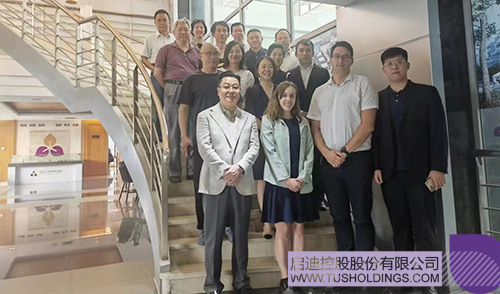

- Press Center

Hauts-de-France Delegation Visits TusHoldings to Discuss Sino-French Cooperation in Science, Technology, and InnovationPrint
Post Time:2024-07-19来源:TusHoldings
On July 18, a delegation from the Hauts-de-France region visited Tus Yangtze River Delta Science Park. They held discussions with the Tus regional team and Shanghai enterprises on Sino-French cooperation in science, technology, and innovation.

French delegates — Jérôme Brossier (Director of Economic Affairs, Bethune Urban Community), Emma Morfin (Industrial Project Officer, Bethune Urban Community), and Guillaume Jinkoji (Project Director, Hauts-de-France, Head of Asia-Pacific Projects) — introduced the industrial development and park construction in Hauts-de-France, a region well-known for its industries in railways, automotive manufacturing, and logistics.
Meanwhile, Lille’s high-tech and emerging industries showed great potential, with strong talent pools in engineering and business, excellent infrastructure in transport, education, and research, and comprehensive supply chain management services. The delegates expressed expectations for deeper cooperation with Chinese enterprises.
Mr. Lin Kaisen of Tus Yangtze River Delta Science Park presented TusHoldings’ global industrial layout and technological service strengths, noting that the Yangtze River Delta integration demonstration zone could provide a broad space for Sino-French cooperation.
The two sides identified cooperation areas in new energy, new materials, artificial intelligence, and biomedicine, and agreed on mechanisms for mutual fund investment and industrial resource matching.
During the meeting, a manager from Lenz Global Supply Chain in Germany emphasized the importance of ESG and the impact of the EU carbon tax. He highlighted regulations such as the German Supply Chain Act, human rights principles, and whistleblower systems, as well as strategies for achieving net-zero emissions by 2026 and managing supply chain emissions both internally and externally.
Shanghai enterprise representatives expressed strong intentions to expand overseas but also highlighted challenges, including regulatory differences and compliance requirements. They stressed that Chinese companies need to collaborate more closely to adapt to and benefit from the European investment environment.
The meeting showcased the achievements of both sides in industrial park construction and created more opportunities for enterprise cooperation. Both parties reached consensus on jointly promoting domestic enterprises’ entry into each other’s markets and advancing economic development and technological innovation, in line with the “Two Countries, Two Parks, Two-way, Two-new” strategy.















